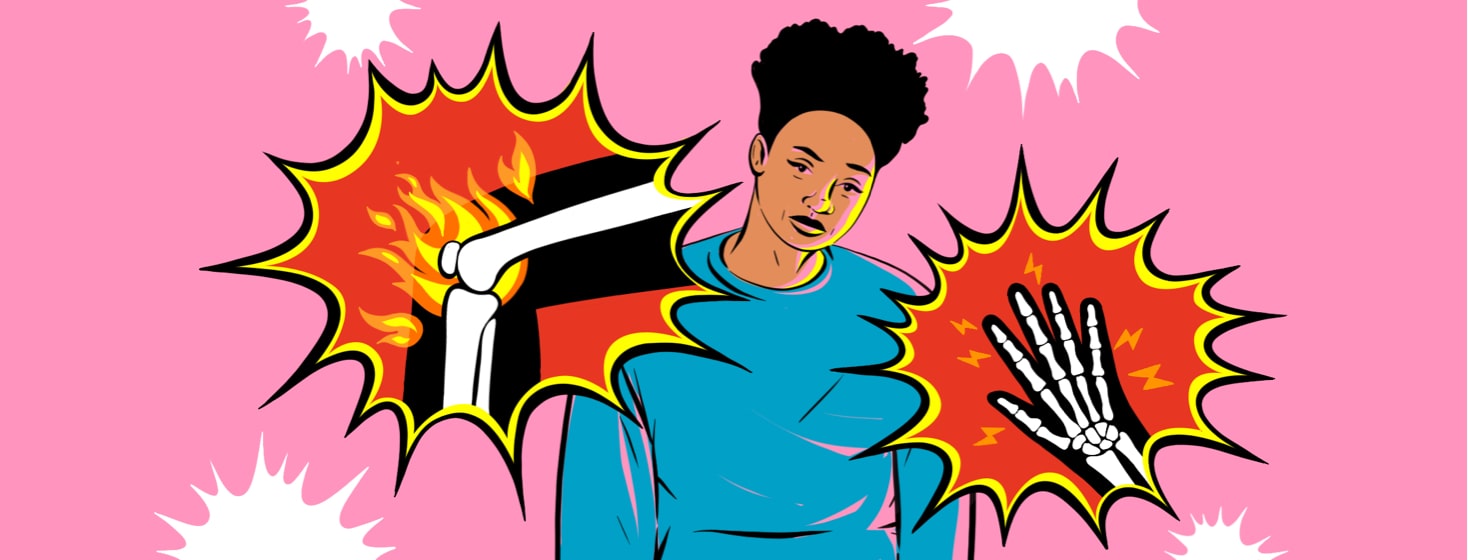RA - Same Disease, New Symptoms
I’ve lived with joint pain for as long as I can remember, but I wasn’t diagnosed with rheumatoid arthritis (RA) until 2016, at the age of 30. I have written more about this process, and what I believe helped me to be properly diagnosed (hint - it has to do with another autoimmune disease). Read them here, here, and here.
My typical RA symptoms
Since childhood, I’ve exhibited some of the "textbook" RA symptoms - always including severe joint pain (which is worst in my knees, hips, ankles, and toes), fatigue and weakness.
I went through several incorrect diagnoses and more inadequate "treatment" recommendations from medical professionals prior to knowing without a doubt I was struggling with RA. I wasn’t ever really surprised that the prescriptions and physical therapy were ineffective, but I distinctly remember being disappointed that nothing was reducing my pain and discomfort. I wondered if I’d be unable to walk without assistance as I got older or getting on and off the floor to play with my dog (and now, my toddler) would be a luxury I lost over time.
When I was finally diagnosed and found a treatment option that managed both my RA and my Crohn’s disease (an IV biologic medication called Remicade), I was literally amazed that my pain went from barely tolerable to some days barely noticeable.
Moving was easier, more fluid, and without so many sound effects. And best of all - some of the fatigue lifted. I felt less like I was living in a fog and more like my old self.
Same RA, new challenges
Although Remicade gave me a significant amount of relief as a baseline management strategy, I still have encountered days of heightened pain, flares, and recently, new symptoms.
I always struggle with an increase in RA symptoms when the weather turns cold. I live in the Midwest, which means sometimes this transition is subtle over time and, sometimes, it's rapid in the blink of an eye. Oh, and sometimes it's both and repeats several times between summer and fall and winter. This season, I found myself noticing 2 new to me RA symptoms - significant joint stiffness and a heated/on fire feeling at some of my joints.
At first, I was caught off guard. Surely a disease I've lived with since childhood and been properly treated for over the last 4 years wouldn't just generate new symptoms, right?
Wrong.
The thing with rheumatoid arthritis is that symptoms can shift and change as the disease is managed, time goes on, external factors change, etc.
Navigating "surprise" symptoms
To be completely honest, at first, I ignored these new symptoms. I thought they were related to movement or positioning or maybe even an injury I hadn't noticed.
But when they persisted, I realized they were in fact likely related to my RA. I reached out to my rheumatologist, the doctor who manages my RA disease and treatment, and shared the new symptoms with her.
As-needed medication and non-medication therapies
She wanted to know details - when they started, if anything triggered them, how long they'd lasted so far, if they came and went or if they were constant, if anything made them better, etc. Then she recommended some as-needed medication to take in the interim leading up to my next Remicade infusion.
She noted that unfortunately, this is something that can happen with even well-managed rheumatoid disease. We talked about using non-medication therapies like heat/ice, TENS unit, topical cream, and gentle stretches to keep my body feeling as best as possible. We also scheduled a follow-up for next month to talk about any changes.
Have you ever noticed new symptoms arise with your RA? What did that feel like for you? Were you caught off guard, or did you know this could happen? I'd love to hear your experiences below.

Join the conversation